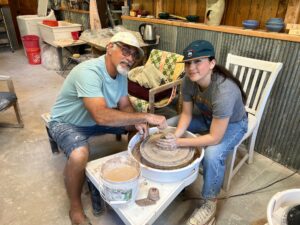Arthritis Relief and The Role of a Skilled Pottery Teacher
Arthritis can be a debilitating condition that affects millions of people worldwide, causing pain, stiffness, and limited mobility in the joints. While traditional treatments such as medication and physical therapy can provide relief, many individuals with arthritis are seeking alternative methods to manage their symptoms and improve their quality of life. One such method that has gained attention in recent years is pottery. In this article, we’ll explore how a skilled pottery teacher can help people with arthritis find relief and regain functionality through pottery practice.
Understanding Arthritis and Its Challenges: Arthritis is a group of conditions characterized by inflammation and stiffness in the joints, which can result in pain and difficulty performing everyday tasks. For individuals living with arthritis, activities that require fine motor skills and dexterity, such as pottery, may seem daunting and inaccessible.
The Therapeutic Potential of Pottery: Despite the challenges posed by arthritis, pottery offers a unique therapeutic outlet for individuals seeking relief from their symptoms. Pottery engages the hands and fingers in a variety of movements, including kneading, shaping, and sculpting clay, which can help improve joint flexibility, range of motion, and strength. Additionally, the tactile nature of clay provides sensory stimulation and promotes relaxation, helping to alleviate stress and tension associated with arthritis.
How a Skilled Pottery Teacher Can Help: A skilled pottery teacher can play a crucial role in helping individuals with arthritis overcome their physical limitations and enjoy the therapeutic benefits of pottery practice. Here’s how:
- Adapting Techniques: A knowledgeable pottery teacher can modify traditional pottery techniques to accommodate the specific needs and abilities of individuals with arthritis. By offering alternative methods and tools, such as ergonomic clay tools and adaptive equipment, a teacher can help arthritis sufferers engage in pottery activities with greater ease and comfort.
- Providing Gentle Guidance: Pottery teachers are trained to provide gentle guidance and support to their students, particularly those with physical limitations. By offering encouragement and reassurance, a teacher can help individuals with arthritis feel empowered and confident in their ability to participate in pottery practice.
- Fostering a Supportive Environment: Pottery studios often foster a supportive and inclusive atmosphere where individuals of all abilities can come together to create and connect. By creating a welcoming and non-judgmental space, a pottery teacher can help individuals with arthritis feel accepted and valued for their unique contributions to the pottery community.
- Encouraging Mindful Practice: Pottery practice encourages mindfulness and presence in the moment, which can be especially beneficial for individuals with arthritis who may experience pain and discomfort. By focusing on the sensations of working with clay and the rhythmic movements of their hands, individuals can find relief from their symptoms and experience a sense of calm and relaxation.
- Promoting Self-Care and Self-Expression: Engaging in pottery practice allows individuals with arthritis to prioritize self-care and self-expression, which are essential components of overall well-being. By creating pottery pieces that reflect their unique style and personality, individuals can experience a sense of accomplishment and fulfillment, boosting their mood and enhancing their quality of life.
In conclusion, a skilled pottery teacher can provide invaluable support and guidance to individuals with arthritis seeking relief and empowerment through pottery practice. By adapting techniques, providing gentle guidance, fostering a supportive environment, encouraging mindful practice, and promoting self-care and self-expression, a teacher can help arthritis sufferers discover the transformative power of pottery and reclaim their joy in creating. So, if you or someone you know is living with arthritis, consider reaching out to a skilled pottery teacher and exploring the therapeutic benefits of pottery practice today.

